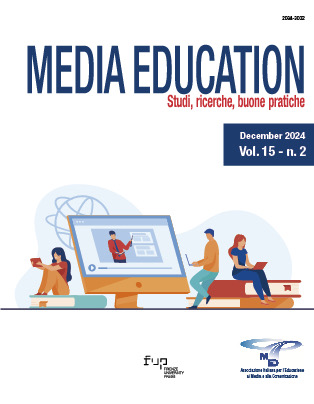Onlyfans, un’indagine per comprendere il rapporto degli adolescenti con intimità e nuove vetrinizzazioni
Published 2024-12-30
Keywords
- OnlyFans,
- generation Z,
- social identity,
- sexuality
Copyright (c) 2024 Francesco Pira

This work is licensed under a Creative Commons Attribution 4.0 International License.
Abstract
The image is central in social relations, a self packaged to present itself to the public, constructed to be liked, to collect likes and to be shared, commented on. This is a true externalization of our individuality, which increasingly places the display of the body as other than self at the center (Pira, 2017). In this sense we are witnessing a transformation of intimacy, the resulting representation of the self appearing as a public expression in a medial key. In this path precisely the dimensions of the body and sexuality seem to assume a centrality that gives them a strong relevance in the identity construction of each person. In this perspective, we intend to provide an analysis on the Onlyfans phenomenon through the anonymous administration of a self-completion questionnaire in CAWI mode, which involved 1116 respondents between the ages of 14 and 30. The title of the survey was “The Impact of OnlyFans on Generation Z.” In fact, the platform is mainly associated with sexual content. Based on the assumption that OnlyFans creators are in a unique position, at the intersection of professional social media content creation and sex work, we tried to identify what attitude young people interviewed have toward the OnlyFans platform; to understand what is their perception of the social and the definition they give in relation to the content conveyed; and to understand what their attitude is in relation to the perceptions of sexuality and individual freedom of expression.
References
- Ball, M. (2022). Metaverso – Cosa significa, chi lo controllerà, e perché sta rivoluzionando le nostre vite, Garzanti, Milano.
- Baudrillard J. (1974). La société de consommation. Ses mythes se structures, Paris Gallimard
- Bauman Z. (2012). Modernità Liquida, Edizioni Laterza, Bari.
- Boyd d., (2014), It’s complicated: The Social Lives of Networked Teens, Yale University Press, New Haven (trad. it. It’s complicated. La vita sociale degli adolescent sul web, Castelvecchi, Roma).
- Castells M. (1996). The Rise of the Network Society, Oxford, Blackwell Publishing Ltd, tr. It., 2002, La nascita della società in rete, Egea, Milano.
- Castells M. (2004). The information Age: Economy, Society and Culture, vol.2 The Power of Identity, Blackwell, Oxford (trad. it. Il potere delle identità, Egea, Milano 2008)
- Castells M. (2009). Communication Power, Oxford, University Press, (trad. it.(2009) Comunicazione e Potere, Milano, Egea).
- Eurispes (8 agosto 2024). OnlyFans un fenomeno del web in costante crescita. https://www.leurispes.it/onlyfans-un-fenomeno-del-web-in-costante-crescita/
- Floridi L. (2014). La quarta rivoluzione. Come l’infosfera sta trasformando il mondo, Raffaello Cortina Editore, Milano.
- Floridi L. (2022). Etica dell’intelligenza artificiale. Sviluppi, opportunità, sfide, Raffaello Cortina Editore, Milano.
- Hamilton V., Soneji A., McDonald A. & Redmiles E. (2022). Nudes? Shouldn’t I charge for these?”: Motivations of New Sexual Content Creators on OnlyFans, > cs > arXiv:2205.10425, Cornell University, New York. https://doi.org/10.48550/arXiv.2205.10425 DOI: https://doi.org/10.1145/3544548.3580730
- Han Byung-Chul (2021). Sano intrattenimento. Una decostruzione della passione al dell’Occidente, Nottetempo, Milano.
- Han Byung-Chul (2022). Le non cose. Come abbiamo smesso di vivere il reale, Einaudi, Torino.
- Litam S.D.A, Speciale M., Balkin R.S. (2022). Sexual Attitudes and Characteristics of OnlyFans Users, Springer Science+Business Media, LLC, part of Springer Nature. DOI: https://doi.org/10.1007/s10508-022-02329-0
- Parisier E. (2011). The Filter Bubble. What the Internet is Hiding from You, Penguin Books, London (trad. it: Il filtro. Quello che Internet ci nasconde, Il Saggiatore, Milano, 2012).
- Onlyaccounts (23, August 2023). https://onlyaccounts.io/blog/onlyfans-creators-posted-200m-pieces-of-content-in-seven-months-58- more-than-in-the-same-period-a-year-ago/
- Pira F. (2017). Facebook e i social: nuovi luoghi di sperimentazione dell’identità di genere (Parte sesta: La questione gender oggi: spunti sul dibattito attuale pp 349-362) in (a cura di) Gensabella Furnaro M. Identità di genere e differenza sessuale. Percorsi di studio (collana Bios, Ethos e Polis), Rubettino, Bologna.
- Pira F. (2020). Figli delle App. le nuove generazioni digital-popolari e social-dipendenti, FrancoAngeli, Milano.
- Pira F. (2021a). La crisi del modello della produzione culturale: la vetrinizzazione esasperata = The crisis of the cultural production model: the exasperated vitrinization. 247-268. H-ermes, J. Comm. 20 (2021), 247-268.
- Pira F. (2021b). Le nuove generazioni social – dipendenti, 52-67, Sociologie Vol. II, n° 1 (2021) – ISSN Online 2724-6078
- Pira F. (2023). Disinformation a problem for democracy: profiling and risks of consensus manipulation, Frontiers in sociology, Front. Sociol., 11 May 2023. Sec. Media Governance and the Public Sphere Volume 8 – 2023. DOI: https://doi.org/10.3389/fsoc.2023.1150753
- Riva G. (2014). Nativi digitali. Crescere e apprendere nel mondo dei nuovi media. Il Mulino, Bologna.
- Eurispes (2024). OnlyFans un fenomeno del web in costante crescita. https://www.leurispes.it/onlyfans-un-fenomeno-del-web-in-costante-crescita/
- Cardoso D. & Scarcelli C.M. (2021). The bodies of the (digitised) body. Experiences of sexual(ised) work on OnlyFans, MedieKultur 2021, 71, 98-121 ISSN 1901-9726 Published by SMID | Society of Media researchers In Denmark | www.smid.dk DOI: https://doi.org/10.7146/mediekultur.v37i71.122642
- van Doorn N. (2017). Platform labor: On the gendered and racialized exploitation of low-income servicework in the ‘on-demand’ economy. Information, Communication & Society, 20(6), 898–914. https://doi.org/10.1080/1369118X.2017.1294194 DOI: https://doi.org/10.1080/1369118X.2017.1294194
- Van Dijck J. (2013). The Culture of Connectivity: a critical History of Social Media, Oxford University Press, Oxford. DOI: https://doi.org/10.1093/acprof:oso/9780199970773.001.0001
- Van Dijck J., Poell T. & de Waal M. (2019). The Platform Society, Oxford University Press, tr. It., 2019, Platform Society. Valori pubblici e società connessa, Guerini e Associati, Milano. DOI: https://doi.org/10.1093/oso/9780190889760.001.0001
- Zuboff S. (2019). Il capitalismo della sorveglianza. Il futuro dell’umanità nell’era dei nuovi poteri, Luiss University Press, Roma.

